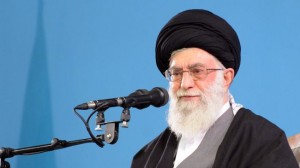 TEHRAN — Iran’s supreme leader, Ayatollah Ali Khamenei, said Tuesday that his country should embrace diplomacy over militarism, saying it was time for “heroic leniency,” and signaled his embrace of international outreach efforts by new President Hassan Rouhani.
TEHRAN — Iran’s supreme leader, Ayatollah Ali Khamenei, said Tuesday that his country should embrace diplomacy over militarism, saying it was time for “heroic leniency,” and signaled his embrace of international outreach efforts by new President Hassan Rouhani.
Although Khamenei said the Islamic republic must never abandon its revolutionary ideals and objectives, he said it was time to address Iran’s diplomatic rows with major world powers.
Earlier Tuesday, Iran’s foreign ministry confirmed that Rouhani and President Obama have exchanged letters in recent days.
“I agree with what I called ‘heroic leniency’ years ago, because such an approach is very good and necessary in certain situations as long as we stick to our main principles,” Khamenei said.
Khamenei’s words were the clearest indication to date that Rouhani’s government has his support, but to maintain it the new administration must approach potential negotiations with the United States and other major powers cautiously.
In his speech, Khamenei also rejected the claim made by some world powers that Iran is trying to develop nuclear weapons and accused such countries of a three-pronged policy of “making wars, poverty and corruption.”
“We do not believe in nuclear weapons because of our beliefs, not for the sake of the U.S. or other countries, and when we say that no country should possess nuclear weapons, we ourselves are definitely not trying to possess them,” Khamenei said.
Khamenei made the speech at a meeting of members of Iran’s Revolutionary Guard Corps a day after Rouhani addressed the same group.
Khamenei told the military commanders that “it is not necessary for the IRGC to be active in the political field, but defending the revolution requires that they understand political realities.”
The remarks come just ahead of Rouhani and his foreign policy team’s trip to New York to attend the annual U.N. General Assembly.
Rouhani and Obama will address the gathering Sept. 24.
By The Washington Post
The Iran Project is not responsible for the content of quoted articles.

 QR code
QR code